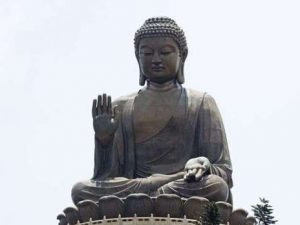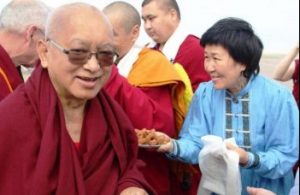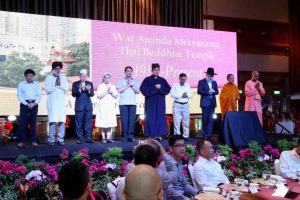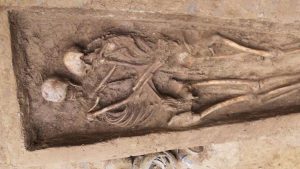
Behind the daily activities of the world’s Buddhist communities, a quiet milestone is being reached. This inconspicuous revolution will reach a climax on September the 9th through to the 12th, at the Hyatt Regency in New Delhi. A sumptuous convergence of the world’s Theravada, Mahayana, and Vajrayana heavyweights will complete the heavy meetings, discussions, and debates held since the Global Buddhist Congregation in 2011.
There are many Buddhist conferences, assemblies, and symposia held each year, but none will be more important than this one, the 1st Founding Members’ Conclave of the International Buddhist Confederation. Himalayan Dharmarajas and Thai Sangharajas will be there, along with Japan’s eminent priest bloodlines and even possibly China’s monastics. Buddhistdoor International’s Spiritual Director, Ven. Dhammapala, will be one of the attendees of this potential breakthrough in Buddhist history.

The architect (formally titled Convener) of this Confederation is Venerable Lama Lobzang. His task is, of course, religious, but it is also political. It is political because he needs to acquire the Bihar government’s cooperation to secure his vision of protecting Buddhist sites. The Confederation’s basic objective is to give these historically neglected sites the voice of a strong, global advocacy group. Until its founding, only private philanthropists and individual foundations have had the capacity and initiative to provide funding and projects towards the preservation of sacred sites. The Confederation aims to radically turbocharge this calling to conservation.
Here, we must resist making “politics” a dirty word, for politics simply means the science of government and mediation on
behalf of a “polity”, a body of people. In the case of the Buddhist polity, the Dharma’s diffusion has spread too far for cohesive, true unity. It has saturated so many different cultures that no voice has ever dared to speak for the world’s Buddhists. Not even the modern, social media age of celebrity masters has altered this tradition. Our Sangha of the Ten Directions has remained fragmented for over two and a half millennia. But those two and a half millennia were then, and this is now.
The schedule of the Conclave quite clearly indicates the necessity for political organization: there will be elections for Confederation leaders, forums on building the Confederation’s headquarters, and discussion about the corpus funds and financing for its activities. The organizers have accepted the Bihar government’s suggestion to extend the event to a trip through Bodhgaya, Rajgir and Nalanda from the 13th to the 14th. These two days will involve discussions in Patna with government figures about the question of Buddhist heritage and the signing of a Memorandum of Understanding between civil authorities and IBC emissaries. The elected body of the Confederation, led by Office Bearers (who represent the highest echelons of the IBC’s influence), will be responsible for speaking as a unified voice on behalf of preserving the foundations of Buddhism.
September’s panel sessions provide some indications of these foundations’ components. Firstly, the language of the Buddha’s textual revelation, Pali and Sanskrit, needs to be kept alive. The preservation and development of Buddhist sites is also crucial, and the uncomfortable truth is that Buddhist sites across South and Central Asia have languished under poor management and neglect. Only a body as united as the Confederation can persuade governments, businesses, and charities to pull together and provide the preservation Buddhist sites deserve.
I interviewed Lama Lobzang on the 18th of June, and discussed with him at length about the Confederation’s prospects. If this Conclave is successful, it will be Lama Lobzang’s most impressive achievement, worth many enlightened lifetimes. But it will also be monumentally difficult. Critically, the IBC needs to show a strong united voice in Bihar if it is to achieve Lama Lobzang’s vision. It needs to send a clear and consistent message that all Buddhists care deeply about the tradition’s collective heritage. Itmust also take meaningful action to legitimize its claim to custodianship. Buddhists around the world will need reassurance that the Confederation will put the priorities of Indian Buddhist sites first. If Lama Lobzang can do this, then the Conclave will live up to its historic potential.
Watch the interview with Lama Lobzang












